Couple therapy provides a safe space for partners to address relationship challenges with a neutral third party․ It combines psychotherapy, coaching, and counseling to foster understanding and growth․
Guided journey counseling emphasizes solution-focused brief therapy and cognitive-behavioral techniques, helping couples navigate emotional struggles and strengthen their connection through effective communication and conflict resolution strategies․
1․1 Definition and Purpose of Couple Therapy
Couple therapy is a collaborative process where partners work with a neutral therapist to address relationship challenges․ Its purpose is to improve communication, resolve conflicts, and strengthen emotional bonds, fostering a healthier connection․ Guided journey counseling integrates psychotherapy and coaching, helping couples navigate emotional struggles and develop strategies for long-term relationship growth and understanding․
1․2 The Role of a Couples Therapist
A couples therapist serves as a neutral guide, helping partners navigate emotional challenges and relationship dynamics․ They facilitate open communication, conflict resolution, and understanding, enabling couples to address issues constructively․ Therapists may use techniques like cognitive-behavioral therapy or solution-focused approaches to help reframe negative narratives and foster resilience in the relationship․
By providing tools and strategies, the therapist empowers couples to strengthen their connection and work collaboratively toward a healthier partnership․

The Concept of Guided Journey Counseling
Guided journey counseling combines psychotherapy, coaching, and counseling to address relationship challenges․ It focuses on solution-focused brief therapy and cognitive-behavioral techniques to help couples navigate emotional struggles constructively․
2․1 What is Guided Journey Counseling?
Guided journey counseling is a therapeutic approach combining psychotherapy, coaching, and counseling to address relationship challenges; It emphasizes solution-focused brief therapy and cognitive-behavioral techniques, helping couples navigate emotional struggles․ This method fosters a non-judgmental space for partners to explore issues, improve communication, and strengthen their connection, promoting personal and relational growth through structured, goal-oriented sessions․
2․2 How It Differs from Traditional Counseling
Guided journey counseling differs by integrating psychotherapy and coaching, focusing on solution-focused brief therapy and cognitive-behavioral techniques․ It emphasizes future-oriented goals and empowerment, unlike traditional counseling, which may explore past issues․ This approach is structured, action-oriented, and holistic, addressing both emotional and practical challenges to foster relational growth and resilience․
Benefits of Couple Therapy
Couple therapy enhances communication, resolves conflicts, and strengthens emotional bonds․ It fosters understanding, trust, and intimacy, helping partners navigate challenges and build a resilient relationship․
3․1 Improving Communication
Couple therapy focuses on enhancing communication by teaching active listening and effective expression of emotions․ It helps partners clarify misunderstandings, express needs clearly, and foster mutual understanding, reducing conflicts and strengthening their bond․
3․2 Resolving Conflicts Effectively
Couple therapy equips partners with tools to address disagreements constructively․ Techniques like active listening and problem-solving strategies help couples move beyond blame, fostering collaboration․ Therapists guide them to identify patterns and shift focus from winning arguments to understanding each other, promoting healthier conflict resolution and strengthening the relationship․
3․3 Strengthening Emotional Connection
Couple therapy helps partners rebuild and deepen their emotional bond by fostering empathy and understanding․ Through guided techniques, couples learn to express emotions effectively, creating a supportive environment․ This renewed connection strengthens trust and intimacy, allowing relationships to flourish on a deeper, more meaningful level․
Techniques Used in Couple Therapy
Couple therapy employs methods like cognitive-behavioral therapy and solution-focused approaches to address relationship issues․ These techniques help couples improve communication, reduce conflicts, and rebuild emotional connections․
4․1 Cognitive-Behavioral Couple Therapy (CBCT)
Cognitive-Behavioral Couple Therapy (CBCT) focuses on identifying and challenging negative thought patterns and behaviors that harm relationships․ It helps couples replace these with positive interactions and problem-solving strategies․ This approach, recently standardized by Sophie Bergeron, addresses self-defeating narratives, fostering emotional understanding and improving communication․ CBCT is evidence-based and effective in addressing relationship dynamics and conflict resolution;
4․2 Solution-Focused Brief Therapy
Solution-Focused Brief Therapy (SFBT) emphasizes identifying and building on a couple’s strengths and goals․ It focuses on solutions rather than problems, encouraging positive interactions and future-oriented thinking․ This approach helps couples move beyond conflicts by setting achievable objectives and fostering resilience․
By concentrating on exceptions to problematic patterns, SFBT promotes constructive changes, enhancing communication and emotional connection․ It is a time-efficient method that empowers couples to create meaningful improvements in their relationship․
4․3 Gottman Method Couples Therapy
The Gottman Method is a research-based approach focusing on improving emotional connection and conflict resolution․ It helps couples understand each other’s needs, strengthen communication, and build a supportive relationship environment․ This therapy emphasizes empathy, trust, and mutual respect, guiding couples to navigate challenges effectively and foster long-term relationship satisfaction․

Finding a Couples Therapist Near You
Online directories and referral networks simplify locating licensed professionals․ Use platforms like Gottman Referral Network or Psychology Today to find experienced therapists near your location, ensuring quality support for your relationship needs․
5․1 Online Directories for Couples Therapists
Online directories like Psychology Today and the Gottman Referral Network offer extensive lists of licensed couples therapists․ These platforms allow you to filter by location, insurance, and areas of expertise, ensuring you find a qualified professional near you․ Many directories also provide therapist profiles, reviews, and credentials, helping you make an informed decision for your relationship needs․
Such resources streamline the process of locating a therapist who specializes in guided journey counseling or other evidence-based approaches, making it easier to address relationship challenges effectively;
5․2 The Importance of Credentials and Experience
Ensuring your therapist has proper credentials and experience is crucial for effective couple therapy․ Look for certifications in specialized approaches like the Gottman Method or Solution-Focused Brief Therapy․ Experienced therapists bring proven techniques and a deeper understanding of relationship dynamics, enhancing the likelihood of positive outcomes in guided journey counseling․
Directories like Psychology Today and the Gottman Referral Network highlight therapists’ credentials, making it easier to verify their qualifications and expertise in addressing relationship challenges․
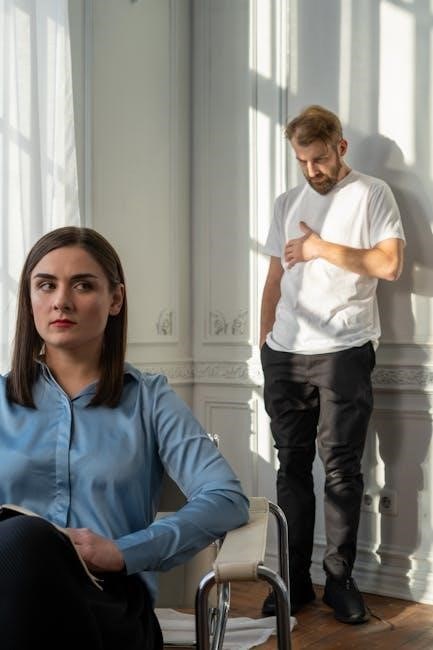
Online vs․ Traditional Couples Therapy
Online therapy offers convenience and affordability, while traditional settings provide privacy and comfort․ Both options cater to different preferences, ensuring accessible support for couples seeking guidance․
6․1 Convenience and Accessibility of Online Therapy
Online therapy offers unparalleled convenience, allowing couples to attend sessions from anywhere globally․ It provides flexibility in scheduling and reduces barriers like travel time or geographical constraints․ This format is particularly beneficial for busy schedules or those with mobility challenges, ensuring accessible support for relationship growth and conflict resolution without compromising comfort or privacy․
6․2 Privacy and Comfort in Traditional Settings
Traditional therapy settings offer a dedicated, private space for couples to explore their relationship dynamics․ The in-person environment fosters a sense of comfort and intimacy, allowing partners to engage deeply in therapy․ Physical presence also enhances non-verbal communication, such as body language and tone, which are crucial for effective emotional connection and conflict resolution․
The familiar setting of a therapist’s office can provide a sense of security, making it easier for couples to address sensitive topics․ This personal interaction often leads to more meaningful and transformative outcomes in therapy, as it encourages authenticity and vulnerability․
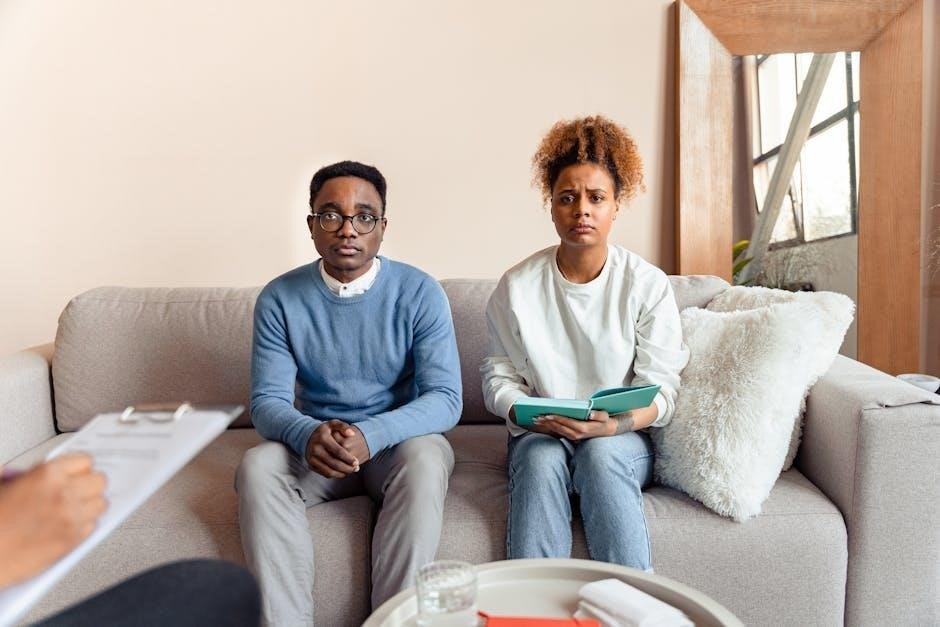
The Role of the Therapist in Guided Journey Counseling
The therapist acts as a guide, helping couples identify negative patterns and fostering healthy communication․ They use techniques like cognitive-behavioral therapy to address relationship challenges and promote emotional understanding․
7․1 Facilitating Change and Resolution
Therapists in guided journey counseling help couples identify harmful patterns and work toward constructive solutions․ By fostering open dialogue and empathy, they guide partners in addressing specific issues, such as communication breakdown or trust problems, and encourage actionable steps to resolve conflicts and strengthen their relationship․ The goal is to empower couples to achieve lasting, positive change together․
7․2 Helping Couples Navigate Emotional Challenges
Therapists in guided journey counseling use techniques like cognitive-behavioral therapy to help couples address emotional struggles․ They create a supportive environment, guiding partners through exercises that foster empathy and understanding․ By focusing on solution-oriented approaches, therapists empower couples to overcome emotional barriers, enhance communication, and rebuild trust, ultimately strengthening their relationship in a constructive and meaningful way․
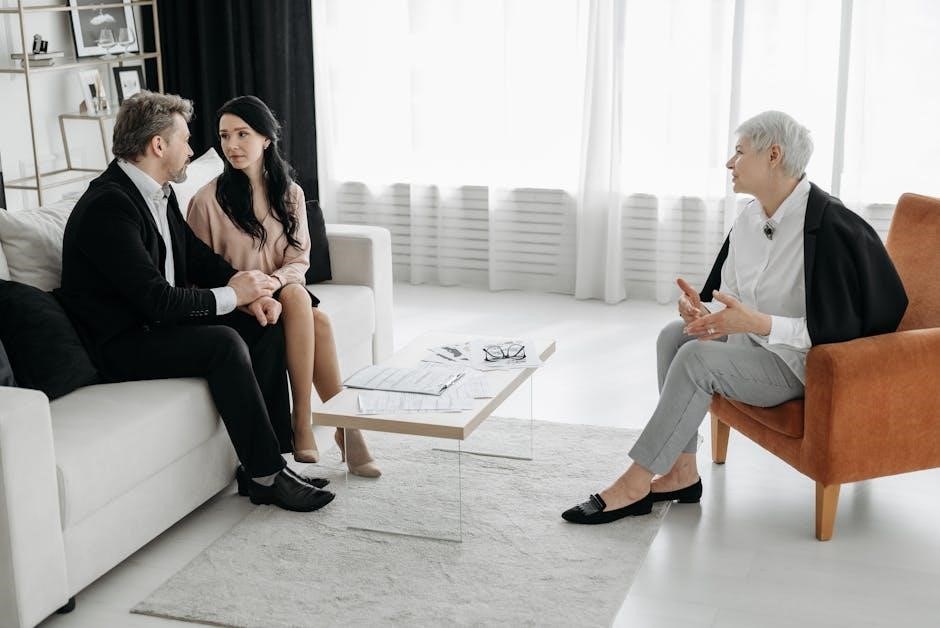
Effectiveness of Couple Therapy
Research shows couple therapy significantly improves relationship dynamics, with high success rates in communication and conflict resolution․ Guided journey counseling techniques, like cognitive-behavioral therapy, enhance emotional understanding and trust, fostering lasting positive change for couples seeking help․
8․1 Success Rates and Studies
Studies demonstrate that couple therapy yields significant positive outcomes, with many couples experiencing improved communication and emotional connection․ Research by Sophie Bergeron highlights a 70-80% success rate in cognitive-behavioral couple therapy (CBCT), showing lasting relationship enhancements․
Guided journey counseling, incorporating solution-focused techniques, has also shown promising results, with couples reporting enhanced trust and conflict resolution skills, leading to sustained relationship satisfaction and emotional well-being․
8․2 Factors Influencing Therapy Outcomes
Therapy outcomes are shaped by factors like the couple’s commitment, communication patterns, and willingness to change․ The therapist’s expertise and alignment with the couple’s needs also play a crucial role in achieving positive results․
Additionally, the effectiveness of techniques such as cognitive-behavioral therapy or solution-focused approaches can influence outcomes․ Couples who actively engage in the process tend to experience more significant improvements in their relationship dynamics and emotional connection․
Common Issues Addressed in Couple Therapy
Couple therapy tackles communication breakdown, trust issues, emotional disconnection, and recurring conflicts․ It helps partners address underlying causes of dissatisfaction and work toward healthier relationship dynamics․
9․1 Communication Breakdown
Communication breakdown often stems from unaddressed issues, emotional responses, and negative patterns․ Couples therapy helps identify these challenges, fostering active listening and clear expression of needs․ By addressing misunderstandings and fostering empathy, therapy guides partners to develop healthier communication habits, enhancing their relationship dynamics and emotional connection․
9․2 Infidelity and Trust Issues
Infidelity and trust issues often arise when emotional needs are unmet or communication falters․ Couples therapy helps partners address the root causes of infidelity, fostering transparency and accountability․ By exploring vulnerabilities and rebuilding trust, therapy guides couples toward healing and strengthens their emotional bond, promoting a more resilient and honest relationship․
9․3 Conflict Resolution Strategies
Couple therapy equips partners with tools to navigate disagreements constructively․ Techniques like active listening, empathy, and problem-solving are emphasized to prevent escalations and foster mutual understanding․ By addressing triggers and promoting healthy communication, therapy helps couples resolve conflicts in a way that strengthens their bond and reduces future disputes․
Guided journey counseling focuses on identifying patterns that lead to conflict, encouraging couples to collaborate on solutions rather than blame each other․ This approach ensures both partners feel heard and valued, fostering a more harmonious relationship․

Preparing for Your First Session
Discuss goals and expectations with your partner beforehand․ Gather information about the therapist’s approach and credentials․ Emotionally prepare by reflecting on key issues to address during the session;
10․1 What to Expect
In your first session, the therapist will typically explain their approach and ask about your relationship goals․ They will listen actively to understand your dynamics and concerns․ The session is a safe, non-judgmental space to discuss challenges openly․ Expect to explore the issues bringing you to therapy and begin identifying patterns or areas needing attention․ This sets the foundation for your therapeutic journey․
10․2 How to Make the Most of Your Therapy Experience
To maximize your therapy experience, approach sessions with openness and honesty․ Actively participate in discussions and exercises, and commit to practicing techniques outside sessions․ Be patient with yourself and your partner, as progress takes time․ Embrace the process with a positive mindset, and remember that therapy is a collaborative journey toward healing and growth together․
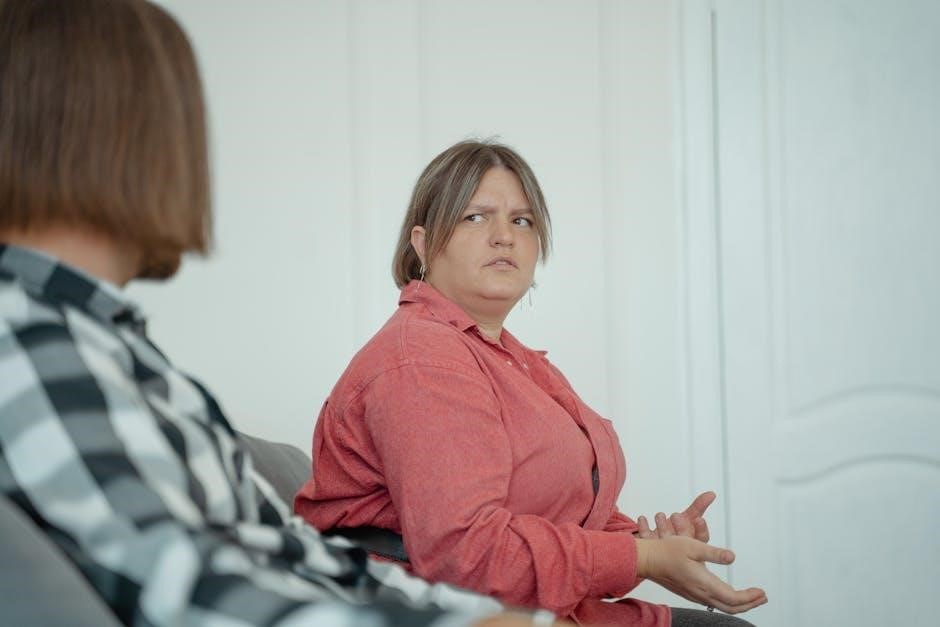
The Future of Couple Therapy
The future of couple therapy lies in integrating technology and innovative approaches like Gottman Method and Solution-Focused Brief Therapy, ensuring accessibility and effectiveness for modern relationships․
11․1 Emerging Trends in Relationship Counseling
Emerging trends in relationship counseling emphasize online platforms and evidence-based methods like the Gottman Method and Solution-Focused Brief Therapy․ These approaches enhance accessibility and affordability, making professional guidance more attainable for diverse couples․
Technology integration allows therapists to reach global audiences, offering flexibility and convenience while maintaining privacy and effectiveness․ Such innovations ensure that modern couples can address relationship challenges efficiently, fostering healthier and more resilient partnerships․
11․2 The Role of Technology in Modern Therapy
Technology has revolutionized couple therapy by offering online platforms that provide convenient access to licensed therapists․ Video conferencing tools enable couples to attend sessions from anywhere, ensuring flexibility and privacy․ This shift has made therapy more accessible and affordable, breaking down barriers for those seeking help․
Additionally, technology supports innovative approaches like AI-driven assessments and virtual reality exercises, enhancing the therapeutic experience․ These tools help couples engage more deeply with their emotions and relationship dynamics, fostering meaningful progress in a modern, tech-savvy world․
Couple therapy, supported by guided journey counseling, offers transformative tools for relationships․ With accessible online options and expert guidance, couples can navigate challenges and foster deeper connections, empowering them to build a healthier, more fulfilling partnership․
12․1 The Importance of Seeking Help
Seeking help through couple therapy is a proactive step toward improving your relationship; It provides a non-judgmental space to address issues, fostering communication and understanding․ Early intervention can prevent conflicts from escalating, while guided journey counseling offers tailored strategies to navigate emotional challenges, ensuring both partners feel heard and supported in their journey toward healing and growth․
12․2 Taking the First Step Toward a Healthier Relationship
Initiating couple therapy is a courageous move toward relationship renewal․ It helps partners overcome hesitation, fostering open dialogue and mutual understanding․ With guidance, couples can address underlying issues, enhance communication, and develop conflict resolution skills, ultimately building a stronger, more resilient bond․ Taking this step signifies a commitment to growth and a brighter future together․
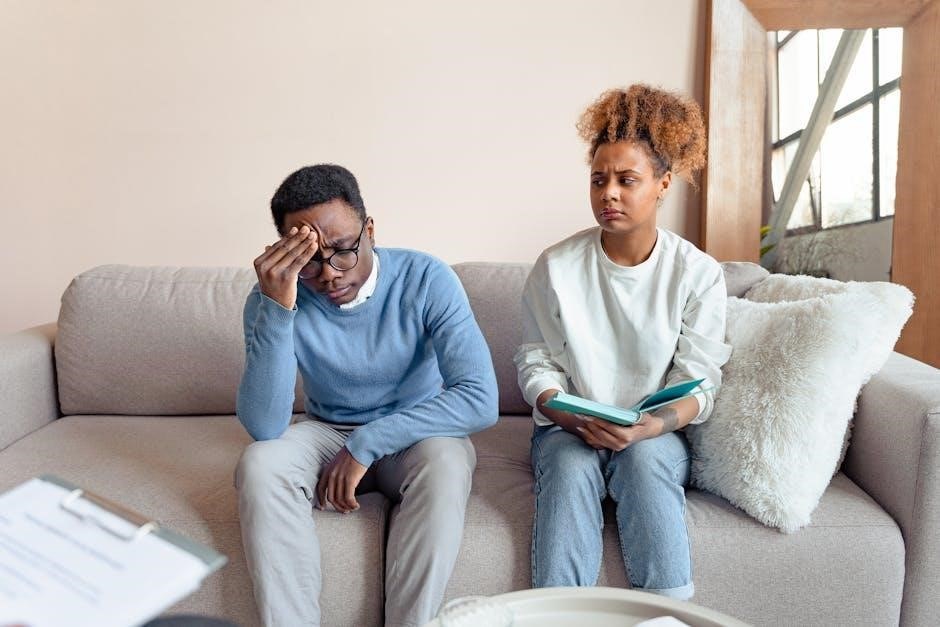
No Responses